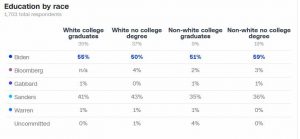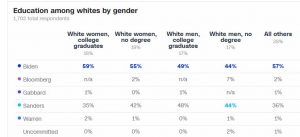Former Secretary of Labor Robert Reich has some messaging tips addressing the health care crisis, which Democratic candidates up and down-ballot may find useful in his article, “Coronavirus Outbreak Proves There Is No Public Health System in the US” at Common Dreams: “Instead of a public health system, we have a private for-profit system for individuals lucky enough to afford it and a rickety social insurance system for people fortunate enough to have a full-time job…Even if a test for the Covid-19 virus had been developed and approved in time, no institutions are in place to administer it to tens of millions of Americans free of charge…Healthcare in America is delivered mainly by private for-profit corporations which, unlike financial institutions, are not required to maintain reserve capacity. As a result, the nation’s supply of ventilators isn’t nearly large enough to care for projected numbers of critically ill coronavirus victims unable to breathe for themselves. Its 45,000 intensive care unit beds fall woefully short of the 2.9 million that are likely to be needed…There is no public health system in the US, in short, because the richest nation in the world has no capacity to protect the public as a whole, apart from national defense.”
In similar vein, Leon Fink writes at Dissent: “Our current healthcare system, with its chaotic and motley mix of private and public insurance systems—along with tens of millions of uninsured—is wholly inadequate to the current crisis, which requires, above all, coordination and universalism. What we need is socialized medicine. The poor and uninsured—including millions of undocumented workers—deserve care. And if they are not invited into the system of health protection, then no one is truly protected…The coronavirus arrived too late to help either Bernie Sanders or Elizabeth Warren, the only two candidates for U.S. president who had prioritized universal access to healthcare. Sanders, the dogged champion of socialized medicine, has supported the right program for decades. But perhaps we need to reconsider his terminology. Likely in an effort to overcome opposition government-run programs, he frames his call within a language of individual rights—everyone has a right to healthcare…Today, we need not just “rights” but a strong public apparatus that is up to the task of governing. Our public health, like our response to climate change, is a social, collective imperative. The impact falls most heavily on low-wage workers and the most vulnerable among us—their welfare and recovery must be priorities—but the consequences reach into every sector of society. And only a powerful, administrative state that dispenses expert authority for the good of all can do the job.”
M4A (Medicare for All) is not the same thing as a functional public health care system, but it’s looking more like a step in the right direction. No doubt some supporters of Bernie Sanders are wondering where his campaign would be, had the Covid-19 pandemic started a couple of months earlier. No one should be too surprised if Biden moves more decisively towards a national health care system in the weeks ahead. But the real fight may be in the U.S. Senate. Former congressman/MSNBC anchorman Joe Scarbrough writes in The Washington Post that Sanders could play a pivotal role now: “If Sanders has that ability to shape the national debate and bend history toward a more just future, then that opportunity is awaiting him on the floor of the U.S. Senate, and not in an empty studio fighting a lost cause by streaming irrelevant campaign speeches…I choose to believe that Sanders will put his constituents and his country first, suspend his campaign and begin in earnest the battle before us all. That fight will be waged more on Capitol Hill than through a presidential campaign that, in effect, ended weeks ago.” In addition to his M4A bill, Sanders, more than any other Senator, has the credibility to advance reforms that can move America towards a functional public health care system.
Charles Pierce shares some salient thoughts on Sanders’s contributions to our current political dialogue at Esquire: “The two presidential campaigns Bernie Sanders has run have cleared the biggest space for progressive ideas that our politics has seen since the Great Society. His 2016 campaign opened 2020 up to progressive ideas and candidates. Now, in extremis, we are seeing the results of that clearing. Good god, the two parties are fighting in Congress over how much Free Money! each of us is going to get. That Bernie Sanders was able to run as strongly as he did in two campaigns is part of the reason for that, and it’s just pigheaded to deny that…it has been a long time since unapologetic liberalism got a serious unequivocal hearing in one of our two major political parties. Bernie Sanders, in his own characteristically grumpy and stubborn way, has forced that issue, and now he’s done so at a time of serendipitous crisis as well. History is going to reckon seriously with him. So should we all.”
At The Guardian, Ady Barkan argues, “Coronavirus crisis: paid sick leave is a start to our collective security as a nation” and observes, “we should not let a crisis go to waste. Some of our most fundamental, bedrock public programs were a product of immense crises and challenges, social security chief among them. Today, we could not imagine life without it. With the heightened threat coronavirus poses to the elderly, where would we be if social security and Medicare were not guaranteed to them? We must look back on this crisis and say the same of guaranteed paid sick leave, in addition to a raft of social protections that will allow us to weather this challenge: such as expansions of social security and unemployment benefits, new direct payments, moratoriums on foreclosures and evictions, student loan debt cancellations, and decisive steps toward a Medicare for All system that can protect everyone – fully and equally – in a crisis like this.”
Alan I. Abramowitz has some bad news for Republicans in his post, “A Coronavirus Recession Could Doom Trump’s Reelection Chances” at Sabato’s Crystal Ball. Abramowitz tempers his conclusions with caveats, while observing, “With major sectors of the economy grinding to a near-standstill due to the pandemic, many economic forecasters are now predicting that the U.S. will experience a major downturn in economic growth in the current quarter that could continue for at least the next two quarters. Some forecasters are predicting a major recession with the economy shrinking by 5% or more in the second quarter of 2020. That’s significant because, in many election forecasting models, including my own “time for change” model, economic growth in the second quarter is a key predictor of the election results…Based on the results of presidential elections since World War II with running incumbents, a president with an upside-down approval rating and an economy in recession would have little chance of winning a second term in the White House. If President Trump’s net approval rating remains where it is now or declines further, and if the recession is severe, with real GDP shrinking by three points or more in the second quarter, the result could well be a defeat of landslide proportions.”
Also at Crystal Ball, Louis Jacobsen’s “One-Party Dominance Extends to Statewide Elected Offices: Up-and-coming candidates from the wrong party in one-party states, like Pete Buttigieg, don’t have much practical chance for statewide advancement” should be of interest to Democrats concerned about leadership development in the party. Jacobsen notes that “For talented young political prospects who belong to the minority party in states dominated by one party, the path to statewide advancement is rocky…In 34 of the 50 states, a single party controls all of the statewide elected offices…Only four states have a relatively balanced mix of Republican and Democratic statewide officeholders.” Of course, Buttigieg and other promising Democrats in these states can emulate the example of Hillary Clinton, who moved to a liberal state and was elected a U.S. Senator.
Ruy Teixeira notes of the tweet below, “There’s Something Wrong With This Poll But I Can’t Quite Put My Finger On It….”












